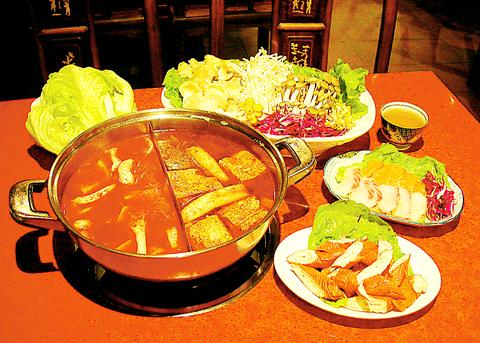Although Taipei has no lack of hot pot restaurants, Wang Yin-chang (
Dream of the Red Chamber was designed to evoke the world of the famous Ching-dynasty novel. Waitresses in traditional Chinese attire usher customers in to an interior composed of imported wooden Chinese furniture and walls decorated with ink paintings that show major characters from the novel. Delicate red lanterns hung from the high ceilings and the double staircase add to the quaint atmosphere of the restaurant, which could serve as a stage set for a Chinese period drama.

PHOTO: VICO LEE, TAIPEI TIMES
It's not that Wang is a big fan of the classical novel. "I've never been able to get through Dream of the Red Chamber. But the idea of setting up a restaurant with a Chinese theme seemed nice. It's far more enjoyable than dining in a plainly decorated restaurant, which most hot pot restaurants are," Wang said.
Dream's spicy hot pots are made with chilis and medicinal herbs imported from Sichuan. Boiling these herbs for 20 hours extracts their nutritional essence and taste and the soup is spicy enough to be proper Sichuan fare without being too hard on the stomach.
Almost all items on the menu go well with spicy hot pot, including the sliced mutton, beef tendon and red rice-flavored intestines, but the squid balls and shrimp balls are Dream's homemade specialties. The secret of their tastes lies in the use of diced water chestnuts, which combines well with the chewy meat. Red yeast hot pot is a dish exclusive to Dream. This dish has proved quite popular among female customers and the health-conscious as its bright-colored ingredients are believed to be good for the circulation in particular and health in general. The fragrant broth is well suited for vegetables, especially pumpkins and mushrooms, of which there are three kinds. Dream's rare coral mushrooms are one of the most popular items.
There's also the seafood hot pot, a good choice for dipping seafood and vegetables, as well. All hot pots come in three sizes, and prices range from NT$300 to NT$500. Excellent desserts and tea are free of charge.

June 9 to June 15 A photo of two men riding trendy high-wheel Penny-Farthing bicycles past a Qing Dynasty gate aptly captures the essence of Taipei in 1897 — a newly colonized city on the cusp of great change. The Japanese began making significant modifications to the cityscape in 1899, tearing down Qing-era structures, widening boulevards and installing Western-style infrastructure and buildings. The photographer, Minosuke Imamura, only spent a year in Taiwan as a cartographer for the governor-general’s office, but he left behind a treasure trove of 130 images showing life at the onset of Japanese rule, spanning July 1897 to

One of the most important gripes that Taiwanese have about the Democratic Progressive Party (DPP) is that it has failed to deliver concretely on higher wages, housing prices and other bread-and-butter issues. The parallel complaint is that the DPP cares only about glamor issues, such as removing markers of Chinese Nationalist Party (KMT) colonialism by renaming them, or what the KMT codes as “de-Sinification.” Once again, as a critical election looms, the DPP is presenting evidence for that charge. The KMT was quick to jump on the recent proposal of the Ministry of the Interior (MOI) to rename roads that symbolize

On the evening of June 1, Control Yuan Secretary-General Lee Chun-yi (李俊俋) apologized and resigned in disgrace. His crime was instructing his driver to use a Control Yuan vehicle to transport his dog to a pet grooming salon. The Control Yuan is the government branch that investigates, audits and impeaches government officials for, among other things, misuse of government funds, so his misuse of a government vehicle was highly inappropriate. If this story were told to anyone living in the golden era of swaggering gangsters, flashy nouveau riche businessmen, and corrupt “black gold” politics of the 1980s and 1990s, they would have laughed.

In an interview posted online by United Daily News (UDN) on May 26, current Chinese Nationalist Party (KMT) Chairman Eric Chu (朱立倫) was asked about Taichung Mayor Lu Shiow-yen (盧秀燕) replacing him as party chair. Though not yet officially running, by the customs of Taiwan politics, Lu has been signalling she is both running for party chair and to be the party’s 2028 presidential candidate. She told an international media outlet that she was considering a run. She also gave a speech in Keelung on national priorities and foreign affairs. For details, see the May 23 edition of this column,